Top 10 Bollywood MoviesWith major films scheduled for release in the upcoming months, Bollywood is poised to amuse in a big manner this year. We present to you the Top 10 greatest Bollywood films of all time in a world where every Friday offers a fresh delight to the box office. This list of the top Bollywood movies in B-Town is based on reviews from the Times of India reviewers, and it has all the details a Bollywood fan could want. This area is for everyone out there who lives for entertainment, from the actors to the review and a brief overview of the film. 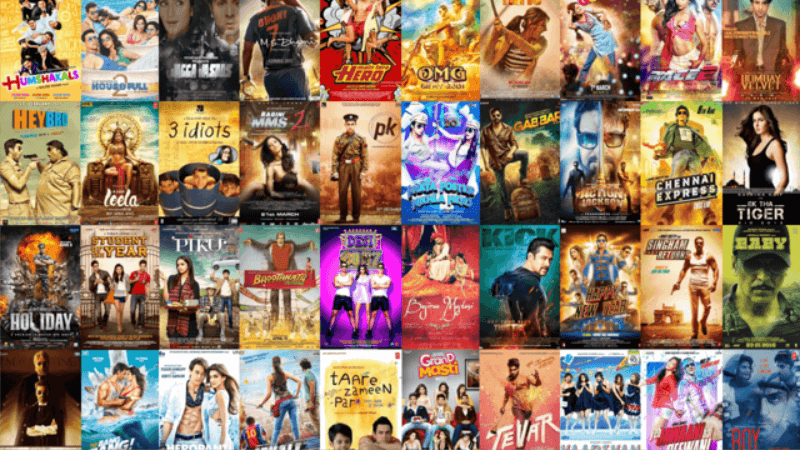
1. Thappad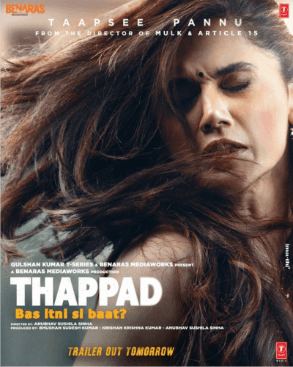
Amrita was raised in a devoted and encouraging Delhi family and educated in Indian classical dance. Her life may have gone in a different direction, but she harboured the ambition to be the finest housewife ever, even if it meant putting her dancing love on hold. Vikram is a go-getter who has his heart and mind set on his objectives and would stop at nothing to realise them. However, he quickly realises that his lofty goals are about to come true and puts it down to office politics. Vikram does the unthinkable: in front of family members on both sides, he unleashes his pent-up resentment toward his faithful wife with a thundering slap. And thus starts a nasty, emotional conflict that goes beyond domestic violence. Vikram continues to live in denial and wonders how 'just one slap' is turning out to be a life-changing event, while Amrita investigates and questions her life choices and their marriage in the wake of the uncalled-for occurrence. The two hours and twenty-one-minute social play by Anubhav Sinha, intended for a culture that seldom ever discusses the emotional and psychological ramifications of domestic abuse, is expected to arouse conversation on various topics. One stress-induced slap at a party turns into a full-blown discussion about the unspoken laws of marriage (where women are constantly reminded that their actions will always be governed by log kya kehenge) and whether it is acceptable for a husband to get away with what he views as one "casual thappad" because he was fuming with rage. The movie "Thappad" does more than merely scream about borderline domestic abuse; it sheds light on the years of conditioning that a woman endures at the hands of her own family and the culture she lives in. Other women are also the focus of the story, including one who is carrying the burden of a family's reputation and legacy, another who believes that marriage is the ultimate goal, a woman from a lower socioeconomic class who is forced to accept that getting beaten by the husband is the norm, and a woman who has loved and lost a good husband and is now trying to find a replacement who surpasses the former. Without being overtly promotional, Sinha is able to weave together all of these narratives and juxtapose them at appropriate points. The subtlety is perfect when their lives' stark contrasts play out. The movie's soundtrack, composed by Anurag Saikia, has a gorgeously melancholy tone and complements the story. With certainty, this strongly stated social drama is Anubhav Sinha's greatest work to date. He merits praise for the nuanced portrayal of the several characters in the movie, their intricacies, grey areas, and moral quandaries without ever being overpowering or pushing too hard to make a point. However, the movie makes a good point and gives you something to think about. A special note should be made of the excellent and nuanced screenplay by Sinha and Mrunmayee Lagoo since it raises the film's quality. Overall, "Thappad" is a silent rebuke of the tenet that Shaadi mein sab kuch chalta hain permeates our society. But should it really be that way? And that's what we need to start discussing right away! 2. Dangal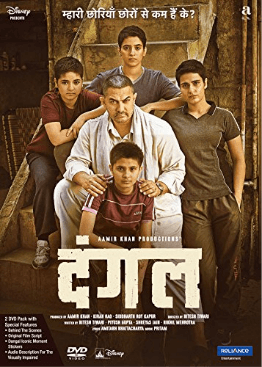
Because Geeta and Babita's remarkable victories at the Commonwealth Games and ensuing championships are well known, Dangal's plot has few shocks. However, this film adaption helps to rehash their difficult path and vividly reenacts their obstinate father's determination to train children as professional wrestlers despite all the hurdles. The movie is also guaranteed to encourage more women to seriously pursue kushti as a sport since it captures the legendary victories of the Phogats, who gave India honour. The writing is what really shines in this case. The film's directors, Nitesh Tiwari, Piyush Gupta, Shreyas Jain, and Nikhil Mehrotra deserve praise for their humorous, tongue-in-cheek style that is sprinkled with some moving father-daughter moments throughout. Of course, the Haryanvi accent causes some of the meaning to be lost in translation. However, messages about our obsession with raising boys (which has persisted since the Middle Ages), our narrow perspective on raising our daughters, and the administration's pitiful attitude toward sports are loud and clear. The fact that the video manages to keep the audience interested in the wrestling competitions and to emphasise patriotic feelings despite the fact that Geeta and Babita's victories are chronicled is commendable. Dangal succeeds most notably because of its excellent performances. Aamir, who is 22 kilogrammes overweight and has grey hair, is ideal as the ziddi yet sympathetic dad. The 51-year-old actor deserves praise for taking chances with his characters as opposed to his contemporaries who like to play it safe. As his wife, Sakshi is tactful but effective. And this year's best discoveries are, without a doubt, the debutantes Fatima and Sanya. The title track by Daler Mehndi pumps up the tension, while music director Pritam and lyricist Amitabh Bhattacharya mastermind the earthy soundtrack. Additionally, the narrative is perfectly complemented by the soft track Gilheriyaan, the Haryanvi rap and hip-hop Haanikarak Bapu, and the Dhakaad number. 3. Parched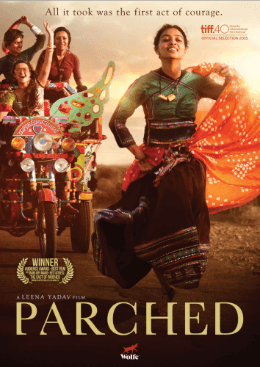
Three women from a hamlet in India's North Western region-a widow named Rani (Tannishtha), a childless woman named Lajjo (Radhika), and a sex worker named Bijli (Surveen)-are victims of long-standing customs, including child marriage, physical violence, drunken husbands, and social apathy. Will they succeed in removing the chains? Parched by Leena Yadav immerses you in a dark and thought-provoking world. The film simultaneously highlights how there is still an India where women are still treated as sex objects, with their sole purpose in life being to serve their male partners, while deftly weaving together the stories of the three protagonists, all of whom have had a difficult life. Having been widowed for 17 years, Rani, who was wed off at the age of 15 to an alcoholic Shankar, is left to care for herself and her heartless son. Lajjo, a country beauty, is physically abused every day and her drunken husband declares her to be "barren." Lajjo and Rani frequently turn to one another for comfort. When they take a break from creating their rozi-roti, they form a relationship with Biji (Surveen), a sex worker who has had it tough for no fault of her own. Their shared desire for love, sex, and compassion, in that order, serves as the basis for their friendship. The movie discusses how a woman's demand for sex or ownership of her body is not humiliating. You may relate to the rural ladies as they discuss their sexual urges. You salute the filmmaker for presenting some challenging concerns about society's double standards, similar to last week's matinee offering Pink. You praise Bijli's question, "Why are there only abuses of the MC, BC type, or gaalis called solely after women and none after men?" Frankly, as the movie implies, perhaps it is time to also name expletives for guys. Russell Carpenter, an Academy Award-winning director of photography, did a fantastic job capturing the desolate countryside. Parched is a route plan for the downtrodden women in our society who have endured centuries of misogynistic thinking. Tanishtha and Radhika are wonderful, but Surveen is the one for whom your heart breaks. 4. Pink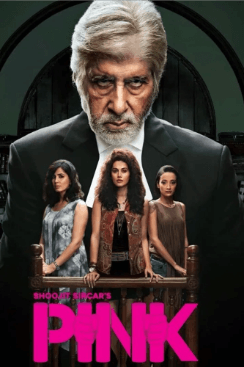
Minal (Taapsee), Falak (Kirti), and Andrea (Andrea) are three Delhi females who are on the run after one of them manages to elude Rajveer's attempted molestation of her (Angad). Minal hits Rajveer severely with a bottle during the attack. Their horror is only getting started! Pink is a potent critique of the prevalent feudal mindset in India, where men and women are held to different standards. The battle for justice is further tainted if the man comes from a wealthy family. As it stands, three middle-class, typical working females named Minal, Falak, and Andrea are merely out for a typical night of fun. They accept Rajveer and two other people's offer to a resort in Surajkund for supper following a rock concert. Unfortunately, after a few beers, their night takes a bad turn. Rajveer advances on Minal despite her blatantly saying "No," and Andrea finds herself being touched inappropriately by Dumpy (Raashul Tandon). She takes up a bottle in self-defence and slams it on his eye, causing him to bleed. The girls head back to their house in the hopes that the evening will just pass. However, the males make their life a living nightmare by intimidating and demeaning them in every way imaginable. The last nail in the coffin is when Rajveer utilises his strong connections to falsely report the girls as prostitutes. The story takes a tragic turn when the girls' defence attorney, Deepak Sehgall (Amitabh), who suffers from bipolar disorder, represents them in court. The courtroom scene, which was influenced by Jonathan Kaplan's The Accused (1988), shows the double standards in our culture as the accused Minal is grilled about her virginity and drinking habits. Pink challenges the social norm that says women with short skirts and those who like drinking with men are immoral. It also teaches you that no man has the right to force himself on a woman, regardless of whether she is a sex worker, a wife, or a slave. Arouse her modesty or both. Bachchan leads the way with flawless acting throughout. Producer and director Shoojit Sircar adds another noteworthy film to his resume with Vicky Donor, Madras Café, and Piku. 5. Udta Punjab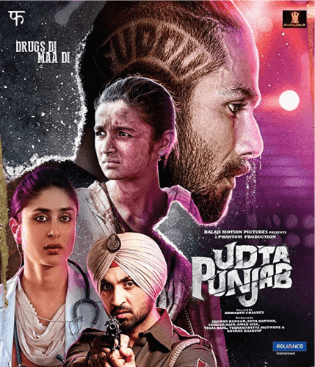
As the drug problem in Punjab worsens, four parallel stories-those of a Punjabi rock singer named Tommy Singh (Shahid), a Bihari immigrant named Kumari Pinky (Alia), a Sikh police officer named Sartaj (Diljit), and a psychiatrist named Preet (Kareena)-are being followed. Their lives are occasionally connected, but not often. Welcome to Chaubey's Punjab, a place you might not want to live in but can't avoid. The state that is famous for wrestlers and wheat also serves out heroin, opium, and cocaine more quickly than parathas and lassis, making it as renowned as Mexico in the present context. Yes, the phrase "Punjab, the country of the five rivers" belongs solely in textbooks. In truth, it's a place under assault by cartels, drugs, and dishonest police. The movie starts with a discus thrower from the other side of the border throwing a package into a Punjabi forest in the middle of the night. The Bihari hockey player who works in the fields scoops up the pink powder on his lap. Thus, her fling with the illegal substance starts. Cut to Tommy's tattooed, armed world. He is an example for young people. Unfortunately, he is also an Alpha male drug addict who only produces songs when he is "coked up" to the eyeballs. Then there are Inspector Sartaj and Manav Vij, who accept blood money without reservations. Only after realising that Prabhjyot Singh (Balli), his younger brother, is a victim does Sartaj's conscience begin to trouble him. The fourth member of the foursome is the Florence Nightingale physician who treats addicts while also working as a reporter on the side in the hopes that her story on drugs may turn the tide. Here, Chaubey takes a hybrid documentary/mainstream tack. The movie might get too ponderous and indulgent after the intermission. This is not your typical sunny-side-up movie, either. It is harsh and unpleasant to look at. But where it succeeds is in making you care about its characters. You sob silently as Alia and Shahid, both drug and physical abuse victims, battle their demons and fates. Alia beats everyone hollow even though Shahid has his act outright. Diljit and Kareena are skilled. The nuanced performances of Satish Kaushik, Prabhjyot Singh, and Manav Vij are also acknowledged in this review. 6. Talvar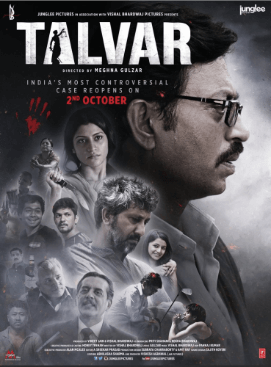
Who killed teenager Shruti Tandon and housekeeper Khempal, and why? What else is cut as the truth is revealed? Talvar immediately strikes at Bollywood's mehendi-fueled, song-and-dance escapism with a sword. Talvar confronts reality front-on and flips it on its head, drawing inspiration from the 2008 Aarushi Talwar double murder case, for which Aarushi's parents are currently serving a life sentence. Talvar gives opposing perspectives on who killed Shruti Tandon and Khempal in nicely divided pieces. Was it the furious parents of Shruti? Outrageous buddies of Khempal? Or did flawed investigations still butcher Shruti and Khempal after they had already been killed? Talvar touches your heart at the loss of two lives and one truth while keeping your intellect racing through the killings' complexities. The acting is outstanding. As Central Department of Investigation (CDI) officer Ashwin Kumar, played by Irrfan, absolutely kills it, every frame is illuminated by his razor-sharp intelligence, sardonic wit, and melting compassion toward his wife Reema (luminous Tabu). As he nonchalantly drawls, "Agli baar koi khoon bhara haath chor jaye, toh dhyan dijiyega," Irrfan exhibits whiplash-like control. Gajraj Rao makes a wonderful paan-chewing foil as the clueless Inspector Dhaniram, whose sloth includes ignoring a decomposing body. He dismisses a bloody sheet with, "Tumhari chadar hai, locker mein daal do, hamein kya?" Konkona and Neeraj portray the Tandons as a subdued duo, whose performance shifts quietly as killers, then victims, while the screen crackles between Irrfan and Gajraj. "Chalo, rona shuru karna hai," Konkona hisses to her husband as Neeraj's eyes speak with gleaming malice. Creepy Kanhaiya (Sumit Gulati), whose slyness adds shades of grey to this hair-raising thriller, significantly enhances the performance. Talvar's frames are persistent, edgy portrayals with layers of truth and falsehoods, TV reporters shouting, "Yahi hai woh ghar!" foggy narco-tests, and backstabbing office intrigues. Pankaj Kumar captures the tension in a small, cramped apartment in the dusty suburbs, cutting between these images with heartbreaking photos of the cheerful sparklers from a Delhi baraat that highlight how miserable the Tandons' life is. While Vishal Bhardwaj's writing haunts and is dense with facts and theories but oddly stark, the taut editing (Sreekar Prasad) is superb. Rashomon was likened to Talvar. However, Rashomon meanders through jungles of illusion, but Talvar bravely confronts reality. It presents two killings in entirely different ways. However, it is clear-cut that a third, fairness, has been destroyed by incompetence and callous crassness. Talvar shines in removing blemishes from the sword of justice. 7. Tanu Weds Manu Return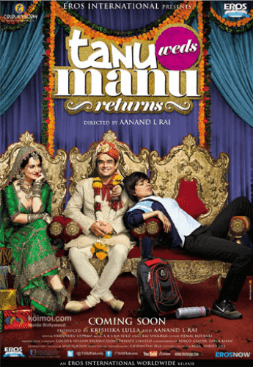
The union between Tanu and Manu dissolves. What transpires when Manu encounters Tanu's doppelgänger Kusum and when Tanu comes back? Tanu Weds Manu Returns is an absolute treat that will have you smiling, laughing, cheering, and guessing the entire time. Four years ago, Tanu (Kangana) and Manu (Madhavan) wed following a turbulent love affair. However, the flames between them go out in London. Manu mopes in Delhi until he meets Haryanvi athlete Kusum (Kangana), who resembles the woman he once loved after the couple splits bitterly. Tanu returns to her hometown of Kanpur and lights it up with her wild-child bohemian ways. Tanu has returned to Manu's life, but will Manu and Kusum still fall in love? One of the greatest double roles in Hindi film history may be seen in Tanu Weds Manu Returns. Both as doll-like drama queen Tanu and as straightforward, dignified, earthy Kusum, Kangana is astoundingly talented. Tanu's peachy beauty, dressy appeal, petulant rosebud mouth, and vain, glittering fragility contrast sharply with Kusum's wide-eyed honesty, flat, sporty figure, and large, dusty teeth. Kangana plays each character with care, accuracy, and elegance, exuding the assurance of a talented queen. Alongside him, Madhavan does a good job as the silent, usually depressed, occasionally optimistic Manu. His shyly perplexed gaze at Kusum, who is sporting the earrings he gave her, is wonderful. As Manu's talkative friend Pappi, Deepak Dobriyal does a fantastic job. Deepak executes superb lines with effortless perfection as he chastises his bewildered friend with, "Are you Salman Khan jo commitment nahin choroge?" while mumbling and grumbling through a sparkling performance. Jimmy Shergill, who plays Tanu's smouldering gangster-contractor ex, is consistently intense. Other roles, such as Kusum's brother Omi and the creepy lawyer Chintu, also work like clocks. The narrative moves quickly. Crisp editing and genuinely authentic graphics keep you surprised as they cram in unique people, humorous sequences (Manu's mother has a whole monologue, nagging), and emotions that tug at your heart while tickling you pink. While gemstone-like visuals conjure up outrageous romance, shattering heartache, and lovely new crushes, the music sparkles. Tanu Weds Manu is back with more philosophy and fun than ever. Being happily in love is difficult. But it's so simple. For his skilful directing of Himanshu Sharma's rich, raucous narrative, Aanand L. Rai deserves praise. Invoking a modern-day Hrishikesh Mukherjee, Rai manages to handle two main females, one of whom merits an additional half-star. Tanu, I apologise, but Kusum is really unique. Like a certain Kangana who has miraculously returned. 8. Queen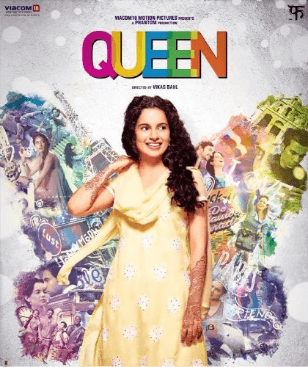
Queen, a naive young woman from Delhi, finds herself on a "honeymoon" by herself. The main plot of this charming, insightful, and enjoyable social drama is what transpires along the road. In a middle-class Delhi home, the action starts. The father works as a mithaiwala; the daughter, Rani Mehra or Queen (Kangana Ranaut), is virginal and eager to wed. She is innocent and, in today's perspective, even seems foolish. Other plans for her are held by destiny. You may safely cut to her leaving on her own for Paris without giving too much away. The beginning of Queen's trip is comparable to Sridevi's in "English Vinglish." Similar to how the Pune housewife felt when she flew to America, this Delhi girl is anxious about her travel to Europe. Their bewildered looks on the journey and when they first arrived at their exotic destination, as well as their Indian clothes and questions about what to eat and whom to talk to, all seem to be the same. That is only a superficial resemblance, though. If not, Rani's self-discovery journey will take a different path. In Paris, Rani encounters the long-legged, dark-haired Indo-French girl Vijaylakshmi (Lisa Haydon). She becomes her companion and teaches Rani about love, desire, and life. Queen's poor self-esteem gradually gives way to unwavering confidence. Before you know it, she's boarding a train for the world's sexiest city. Rani lodges in a dormitory with three guys in Amsterdam. And a friendship is eventually formed by this disparate bunch. You quickly become just as absorbed in their friendship as she is. Outstanding performance by Kangana Ranaut. She's a class act, whether happy or sad, peddling golgappas or foolishly purchasing sex toys, disguising her crush on an Italian restaurateur or expressing extreme dejection over her weak boyfriend Vijya (Rajkummar Rao). Rajkummar Rao and Lisa Haydon provide strong assistance. Vikas Bahl, however, is the rightful owner of this movie. It was his first time travelling alone. He and Nitesh Tiwari co-directed the National Award-winning film "Chillar Party" in the past. In his honour, Bollywood should raise the bugles. 9. Satyagraha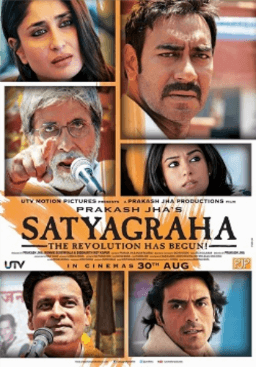
What is the most effective satyagraha in this time of corruption: to preach or to act? A scene in Satyagraha, in which a rainbow briefly shines in between bursts of water striking protesters, perfectly captures the tone of the movie. In Satyagraha, which is richly textured, urban legends of corruption, ranging from slain engineers to corporate lobbyists, are woven together. Slices of history, Mandal, Chauri Chaura, and Anna Hazare's Jan Lokpal Andolan are included. A security guard accompanying a politician to the film's screening sings out loud, "Aam aadmi kitna aam, Raghupati Raghav Raja Ram," as it brings the real problem of corruption to life by movingly fusing fact and fiction. Dwarka Anand (Bachchan), a retired teacher, is a person of ideals. Manav (Devgn), his engineer son Akhilesh's friend, is a driven businessman. Manav treasures his friend, who passes away unexpectedly. In spite of frequent requests to government bureaus, Akhilesh's wife Sumitra (Rao), is not eligible for the compensation announced by Minister Balram Singh (Bajpai). Dwarka hits an obnoxious official out of anger and is then sent to jail. Manav launches a social media campaign to release him, enlisting journalist Yasmin and would-be Bahubali Arjun Singh (Rampal) (Kapoor). Politicians scramble as eager students, hungry workers, and irate middle-class residents join them. Can their actions stop the movement? Devgn is the powerful body of Satyagraha, and Amitabh, who is emaciated with sadness and moves with courage, is its spirit. And Bajpai is its dazzling, evil cloak, giving a silky performance that is so flawless that it makes you shiver. Bachchan speaks on the film's ethos "It is Janta Sarkar's Malik. Malik is nirdesh deta. nahin karta maang." But how should such nirdesh be given? Symbolic opposition violent uprising? Or take a harder, longer route? The Satyagraha is troubled by this issue. It embellishes reality with gloss and loss and is more intellectual than furious. Tears are shed as Dwarka touches the spot on the ground where his kid fell, but Prasoon Joshi's beautiful words, "Uthkar karne hain kuch kaam, Raghupati Raghav Raja Ram," inspire hope. A government babu complains, "Yahan toh table ka bhi bhaada dena padta hai," demonstrating that Satyagraha captured corruption from root to branch. In addition to demonstrating that genuine Satyagraha has no shortcuts, it also demonstrates potential answers that are as fleeting yet potent as a rainbow clearing the air of dust. 10. Kahaani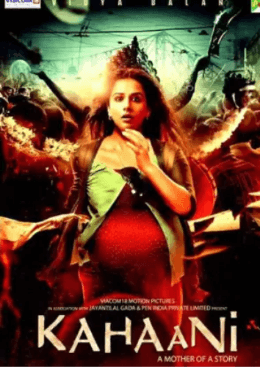
In the bustling back alleys and congested underbelly of the City of Joy, a pregnant Vidya Bagchi arrives from London amid a festive Kolkata. She is looking for her husband, who has inexplicably vanished. Then told that he doesn't actually exist. While it's true that most women would prefer to have their husbands go missing, Vidya Bagchi (Vidya Balan) proves to be an exception as she searches for her husband Arnab Bagchi and finds herself tangled up in a web of enigmatic characters and puzzling clues in a strange and occasionally hostile city. Get ready for another blow to the jaw if, after "The Dirty Picture," you still need persuasion that you won't recognise a prominent "hero" in this one. Again, oddly, a "pregnant" Vidya exhibits more "masculine decorations" (pardon the watering down) than other heroes. She assumes her position with strength and pride. Living out of a suitcase and surrounded by strangers, she adopts the spirit of the metropolis. After watching her performance, you are in awe of an actress because she plays the part as naturally as someone strolling down Chowranghee Lane. Add to that her dishevelled appearance and her eyes that are dark with anguish, and even that is perfected as a pregnant waddle. The rookie policeman Rana (Parambrata Chattopadhyay) lets Vidya take the lead while gently and brilliantly leaving his own mark. Nawazuddin Siddiqui's intelligence officer A. Khan has excellent aptitude as a cold-blooded operative. If anybody, though, can be compared to Balan as a "hero," it is Kolkata itself. From haath rickshaws, and trams, through Kalighat and Camac Street, Setu (cinematographer) has masterfully caught the city's rawness, beauty, and dirt. With all of its festivities and the city being covered in a splash of crimson and white (a symbol for married Bengali ladies). The writing and directing of Sujoy Ghosh lack any 'pregnant' pauses. It delivers the shock value that a thriller justifiably needs. You become completely engrossed in the narrative and are left on a dramatic high. ConclusionIndia has many diverse languages, cultures, and customs, but they all have a deep love of cinema. With more than 1,000 films produced each year, Bollywood, the country's Hindi-language film industry, is one of the most productive in the world (more than twice as many as Hollywood). What makes Bollywood films so sweeping and distinctive? Some contend that every successful Bollywood film adheres to a tried-and-true formula that includes swoon-worthy romance, soaring music, obscenely attractive main actors, and plot twists that are obvious from a distance. Some contend that the key to Bollywood success is much simpler than that; it's simply having fun from beginning to end. The two or more hours you'll need to block out in your calendar to watch these films will be well worth it in any scenario. No matter what kind of movie you prefer-romance, tragedy, or humour-this diverse universe has one for you. These must-watch Bollywood movies, which span a variety of genres, are on our list of the best movies from the country. With so many films to choose from, where do you even begin? The top ten Bollywood films can be used as a road map for navigating the developing industry. While by no means exhaustive, the films listed here span every genre to suit your mood, and both play into and shatter the stereotypes of what the industry is.
Next TopicTop 10 Protein Foods
|
 For Videos Join Our Youtube Channel: Join Now
For Videos Join Our Youtube Channel: Join Now
Feedback
- Send your Feedback to [email protected]
Help Others, Please Share









